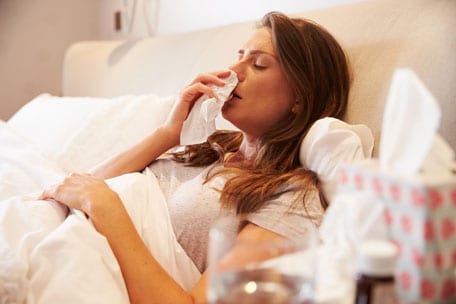What To Do If You Get Sick
If you become sick with flu symptoms, in most cases, you should stay home and avoid contact with other people except to get medical care. If you have symptoms of flu and are in a high risk group, or are very sick or worried about your illness, contact your health care provider (doctor, physician assistant, etc.).
| Learn More |
How do I know if I have the flu?
You may have the flu if you have some or all of these symptoms:
- fever*
- cough
- sore throat
- runny or stuffy nose
- body aches
- headache
- chills
- fatigue
- sometimes diarrhea and vomiting
*It’s important to note that not everyone with flu will have a fever.
What should I do if I get sick?

Most people with the flu have mild illness and do not need medical care or antiviral drugs. If you get sick with flu symptoms, in most cases, you should stay home and avoid contact with other people except to get medical care.
If, however, you have symptoms of flu and are in a high risk group, or are very sick or worried about your illness, contact your health care provider (doctor, physician assistant, etc.).
Certain people are at high risk of serious flu-related complications (including young children, people 65 and older, pregnant women and people with certain medical conditions). This is true both for seasonal flu and novel flu virus infections. (For a full list of people at high risk of flu-related complications, see People at High Risk of Developing Flu–Related Complications). If you are in a high risk group and develop flu symptoms, it’s best for you to contact your doctor early in your illness. Remind them about your high risk status for flu. CDC recommends that people at high risk for complications should get antiviral treatment as early as possible, because benefit is greatest if treatment is started within 2 days after illness onset.
Do I need to go the emergency room if I am only a little sick?
No. The emergency room should be used for people who are very sick. You should not go to the emergency room if you are only mildly ill.
If you have the emergency warning signs of flu sickness, you should go to the emergency room. If you get sick with flu symptoms and are at high risk of flu complications or you are concerned about your illness, call your health care provider for advice. If you go to the emergency room and you are not sick with the flu, you may catch it from people who do have it.
What are the emergency warning signs of flu sickness?
In children
- Fast breathing or trouble breathing
- Bluish skin color
- Not drinking enough fluids
- Not waking up or not interacting
- Being so irritable that the child does not want to be held
- Flu-like symptoms improve but then return with fever and worse cough
- Fever with a rash
In addition to the signs above, get medical help right away for any infant who has any of these signs:
- Being unable to eat
- Has trouble breathing
- Has no tears when crying
- Significantly fewer wet diapers than normal
In adults
- Difficulty breathing or shortness of breath
- Pain or pressure in the chest or abdomen
- Sudden dizziness
- Confusion
- Severe or persistent vomiting
- Flu-like symptoms that improve but then return with fever and worse cough
Are there medicines to treat the flu?
Yes. There are drugs your doctor may prescribe for treating the flu called “antivirals.” These drugs can make you better faster and may also prevent serious complications. See Treatment – Antiviral Drugs for more information.
How long should I stay home if I’m sick?
CDC recommends that you stay home for at least 24 hours after your fever is gone except to get medical care or other necessities. Your fever should be gone without the use of a fever-reducing medicine, such as Tylenol®. You should stay home from work, school, travel, shopping, social events, and public gatherings.
What should I do while I’m sick?
Stay away from others as much as possible to keep from infecting them. If you must leave home, for example to get medical care, wear a facemask if you have one, or cover coughs and sneezes with a tissue. Wash your hands often to keep from spreading flu to others.






















.png)











No hay comentarios:
Publicar un comentario